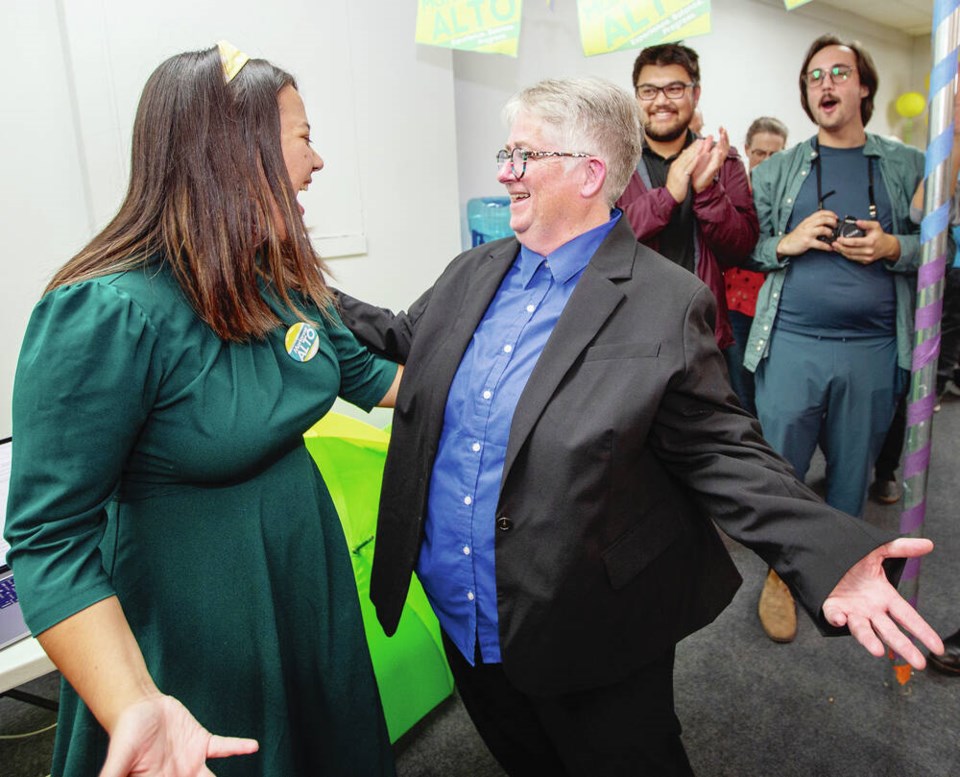Change was in the air during Saturday’s municipal election, with a surprising number of incumbent mayors voted out of office, but in Victoria, where a brand new council was elected, it felt more like evolution than revolution.
Six of the nine new council members were endorsed by departing Mayor Lisa Helps, including three-term Coun. Marianne Alto, who won the mayor’s seat.
“In many ways, Victoria didn’t embrace this theme of change that we’re hearing talked about around the region,” said University of Victoria political scientist Michael Prince.
Prince said Alto’s comfortable win ensured a familiar face chairing meetings and guiding discussion, while Helps’ endorsement of new councillors Jeremy Caradonna, Susan Kim, Matt Dell, Krista Loughton and Dave Thompson was about maintaining focus on housing and affordability.
Also elected was Chris Coleman, who spent 20 years as a Victoria city councillor over six terms, James Bay Neighbourhood Association president Marg Gardiner and Stephen Hammond.
All of the new councillors were endorsed by either Helps, Residents for a Better Victoria — which pushed for more transparent government — or Homes For Living, which pushes housing affordability.
“Those slates snapped up the votes, and I think that’s kind of what cost [councillor Ben Isitt] the election,” said Prince. “People were happy to see these teams.”
Isitt, a three-term councillor who pulled more votes in the 2018 election than any other candidate, finished 1,100 votes behind Gardiner for the final council seat this time around.
Isitt did not immediately respond to requests for an interview.
The loss of Isitt means the only holdover from the last council will be Alto as the new mayor.
“Except for [Coleman], the rest are all fresh faces and that will be a good test of Marianne Alto’s style of leadership,” said Prince.
Alto is already talking about offering guidance and mentorship, which Prince said will be a “practical necessity.”
“But it also maybe speaks to a more collegial, co-operative style, which I think she brings.”
Susan Kim said she feels the council has been given a clear mandate to take bold action on housing and climate change. “And it’s really reassuring that that’s translated across the region with the results we’re seeing,” said Kim, who hopes the new council will build on the housing work done by its predecessors.
Kim said while the council may be fresh-faced, it does have an experienced council member as mayor and a veteran presence in Coleman.
“And then we have folks with a variety of experience from different parts of their own personal and professional lives,” she said.
Coleman, who last sat at the council table between 2014 and 2018, said in many ways he feels like a rookie, as the political game has changed quite a bit since then.
He said municipal politics was affected deeply by the pandemic and residents felt shut out of the process by governments that worked in bubbles. By the time of the election, “an anxious public had become an angry public saying: ‘You’re not listening.’ ”
Proof of that, Coleman said, was the fact people he met during the campaign were keen to talk governance.
“Normally governance is a losing proposition on the doorstep,” he said. “But people were really engaged and I think it’s a sign we recognize that the system isn’t working properly. Trust has been compromised and we want to see something better.
“I think the task for the new council will be not to divide along the lines of the 38 per cent that voted, but for the 100 per cent of the people, including the 62 per cent that didn’t.”
The only formal slate of candidates that stepped forward during this campaign did not get any traction with Victoria voters. 91įŁ┤┤ Island Voters Association Victoria ran seven candidates for council who each earned 4.1 to 8.4 per cent of the vote. Winning a seat on council would have required grabbing at least 33.8 per cent.
Prince said VIVA’s threat was greatly exaggerated by its rivals, who claimed during the campaign it had far-right political ties. “What they provided was a nice foil for other candidates to both kind of create some interest, and be able to communicate some differences between the positions,” he said.
VIVA candidate Jeremy Maddock said that negative spin was inaccurate and probably hurt the slate.
“This idea that we’re all somehow involved with the [People’s Party of Canada] and have far-right priorities … a lot of our candidates were actually more towards the centre left,” he said. “We just want ordinary people to feel like they have a role in the political process and a role holding government to account.”
Maddock said they may not have won a seat, but they earned valuable experience.
“What we need to keep in mind is this is a very new group,” he said, adding “there’s a lot of enthusiasm” for VIVA to stick around.
”We’re more than just an electoral organization. We’re also a non-profit society, and we want to play a role in improving local democracy.”
>>> To comment on this article, write a letter to the editor: [email protected]



